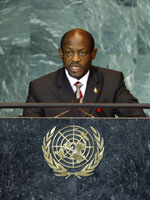Saint Kitts and Nevis
H.E. Mr. Denzil Douglas, Prime Minister
25 September 2008
- Video: English [RealPlayer - 25 min]
- Statement: English [PDF]
- Back to the list of speakers
Statement Summary

© UN Photo
Click for caption and to enlarge
DENZIL L. DOUGLAS, Prime Minister of Saint Kitts and Nevis, said his country’s experience demonstrated that good governance and prudent management of resources, coupled with appropriate investment in people and systems, protecting their freedom of association, religion and speech, and the upholding of democratic ideals, were determined not by land mass, but by national character and political commitment. They were the result of, not demographic or geographic size, but of long-standing socio-cultural traditions.
He said that through its membership in the United Nations for instance, Saint Kitts and Nevis had built important and strategic partnerships, and stood shoulder to shoulder with other Member States to protect its individual rights and collective freedoms. That was why, 25 years on, he was still optimistic about the progress of the United Nations and its ability to defend the poor and needy, despite the pull of competing powerful national agendas that had occasionally risked undermining the ethos of the institution. It was easy to side with the cynics when the Security Council became frozen in stalemate, or when the need for action fell victim to political posturing, he said. But history, especially of the last two decades, indicated that the Organization was far more than the sum of its weaknesses. This was so, because for millions of people around the world, the United Nations was their only hope –- representing a bridge between life and death, a bastion of freedom and a beacon of hope. He was therefore hopeful that a sober and unrelenting analysis of the human consequences of sweeping and globally enforced trade and economic regimes on small States would take place during the current session of the General Assembly.
Reflecting on the state of the global economy, he said it was also his hope that the economic uncertainties that were being experienced in some of the world’s larger economies would sensitize everyone to “the breadth of the uncertainty, the depth of the anxiety, and the real psychological trauma” that often gripped small States when policies formulated far beyond their shores were utterly unresponsive to their entreaties, but were nonetheless thrust upon them. Recent events had thrown into stark relief the issue of the stability of the world financial systems and institutions, and he pointed out that the circumstances that had led to the collapse of those institutions, and the resultant market uncertainties, had not been created by small States such as his. But, yet again, as was the case with climate change, small States were the victims of the acts of others, and were without resources to address the consequences.
[Source: GA/10754]